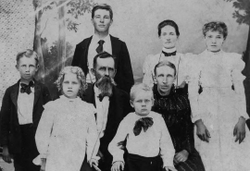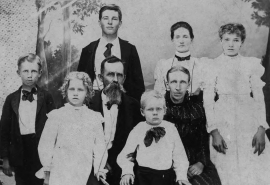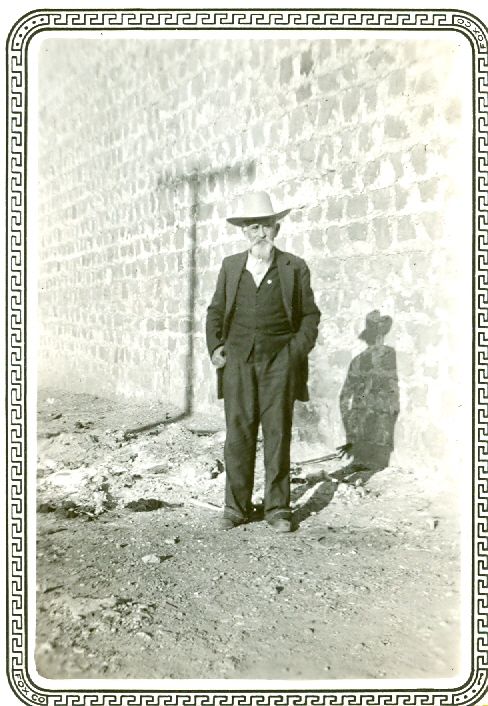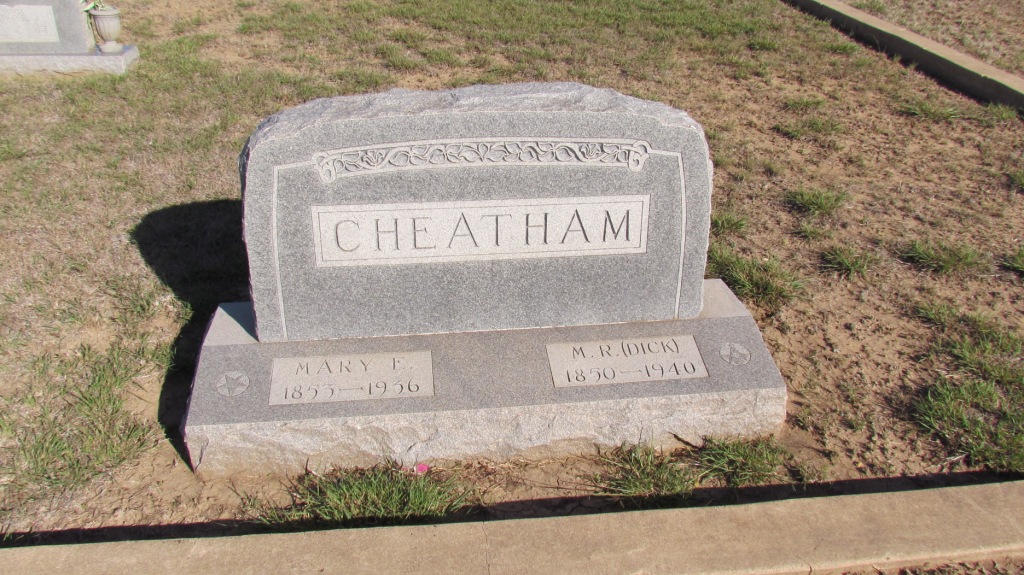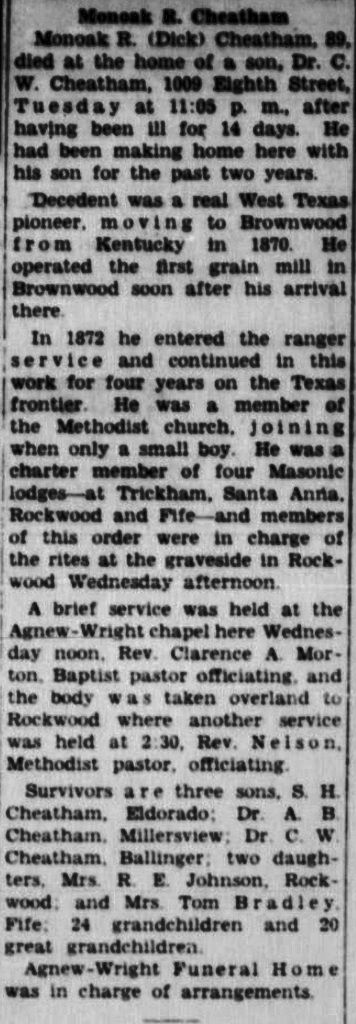He married (1) ALTA MYRA BATTON 11 Jul 1878 in Brownwood, Brown Co. TX. (2) MARY ELIZABETH GRAY 25 Feb 1886.
M.R. "Dick" Cheatham moved to Texas from Kentucky in 1872 in a covered wagon. He joined the Texas Rangers in June 1874 and was stationed in Coleman County as a blacksmith. He was in the Rangers until 1876. The family moved to Trickham, Coleman Co. TX. in 1880 and purchased a cotton gin and a flour mill on the banks of Mukewater Creek at Trickham. They moved next to Rockwood, Coleman County where he also owned a gin and a farm.
The following is an excerpt from the book Into The Setting Sun, A history of Coleman County by Beatrice Grady Gay in 1936.
This chapter was narrated by my great, great grandfather Manoah Richard Cheatham - Bob Bailey:
" I was born in Gradyville, Adair County, Kentucky in 1850, came to Texas in December 1872, in the same covered wagon caravan which brought my boyhood friend Caleb Grady and his people. My brother, Al Cheatham was already in Texas and Settled in Brown County, and so I came and stopped there. There were just five houses in Brownwood at that time. I did job work for a while and in 1873 joined the Texas Rangers under Capt. Jim Connell. The State called us in after three months because of lack of money to pay us.
At that time Brownwood was the western frontier, and the Indian depredations on white settlers on an unguarded border became so frequent and vicious that the Rangers had to be recalled. In June 1874 Captain Jeff Maltby of Burnet county organized a company of 100 rangers and I joined that. This was known as Company E and was stationed in Coleman county for several years, until the Indians were finally driven out of the county. I stayed in Captain Maltby's Co. E twenty six months. Captain Maltby resigned in 1875 because his pay was cut to a Lieutenant's. Lieutenant B. Foster was left in charge. Lieutenant Foster was also a Kentucky man and one of my best friends. He and I messed together while we were in service. I was the camp blacksmith and took care of the horses most of the time. Our first camp after I joined the company was on Clear creek near the western line of Brown county. We stayed there a short time when our camp was moved to Home creek about six miles west of Santa Anna mountain. Soon after we settled on Home Creek I was sent out on the longest scout I ever made. Major John B. Jones came up the line of camps and picked a company of 50 men to go with him on a scouting expedition. He took six or seven men from each company ‘til he has as many as he wanted. I went along as wagon boss and took care of the horses.
"We went south first, as far as Kerrville, circled around and came back into camp. Then we went north to Jacksboro. From there went to the mouth of the Red River, traveled three days up Pease River to the Brazos. From there we turned southeast toward home, scouting all forks of the Brazos and the hills and valleys between there and home. We were gone a month in all that round and we didn't see a single Indian. They knew how to keep out of our way. As we came back down the line each man dropped out at his own camp.
"When we got back from Jacksboro Captain Foster called me and said "Dick, you've had a hard trip, you can have a furlough if you want it." I took a ten-day furlough and went to Brownwood on a visit. I missed a fine chance at a fight with a bunch of thieving redskins while I was away from camp on this furlough.
"One morning when the boys went out to look after the horses they found the Indians had come and stolen three of the best ones we had. As soon as they picked up the trail of the Indians they went back to camp and made up a party to go after them. They ran on to the Indians on East Clear Creek and caught them down off their horses trying to get some water out of a pond which was frozen over. They did not see the Rangers ‘till they were within shooting range. One Indian was shot down and killed at the pond, tow more were killed in a running fight which followed about a mile down the creek. One of the Indians was riding one of our stolen horses. My brother Al Cheatham shot down the horse. When he fell the Indian was hanging far of the side of the horse with his butcher knife in his hand. He was soon disposed of by the rangers' rifle. They took three dead Indians in to Brownwood and hung two of them to a pecan tree on the sough of Pecan Bayou. The third was the tallest man we ever saw. They tied his body upright on a little mule and his feet drug the ground. The mule stayed around camp for several days exciting the curiosity of all who came to town. The ones who were hung in the pecan tree were finally pulled down and eaten by wild hogs. The tall Indian had on lots of ornaments mostly iron rings and beads.
This fight took place where Highway No.67 now crosses Clear Creek a few miles east of where Bangs is. I owned that place then and had built a log cabin on it. My brother-in-law Jack Grady, also my brother Al had built houses on land adjoining mine.
"Once Captain Foster sent me and Webb Arnett to to Brownwood to send a message to the Major. We were intending to spend the night there. While we were eating supper a man came in and told us that he seen a band of Indians driving about seventy five horses a few miles south of Brownwood on this side of the river. He said he climbed to the top of a hill where he could see them and counted them. I said, "Webb, we have got to go back to camp." When we got back there they all gone to bed and were asleep. We woke lieutenant Foster and told him what we had heard. He woke the boys and called for volunteers to be a Santa Anna Mountain by daylight to follow them. We were there before day, seventeen of us with orders to go south ‘til we hit their trail. We struck the trail about three miles south of the mountain and soon came to the place where they camped the night before. It was at the place where the old Coleman and Brady road crossed home creek and is now called Red Bank. The trail was easy to follow as we were not far behind the Indians who couldn't travel very fast with so many horses. The next morning about 10 o'clock we got so near the Indians that the horse tracks showed muddy, and we knew it would only be a short time before we would be on them. The lieutenant who was in command called us to halt and said, "Boys I think we had better turn back, we can't catch these Indians." We were only about 1 mile behind them then, riding two abreast at a brisk pace. When struck the fresh signs they were all set and eager for battle. I'll always see the lieutenant as he sat his horse and gave the order to turn back and how hard it was to obey such orders. The boys laughed at him so much after we got back to camp that he quit when his time was out. I quit the ranger service in September 1876. I was homesick and wanted to see my mother in Kentucky. Lieutenant Foster offered me a 30-day furlough with pay if I would stay in the service but I was ready to quit. After spending a month with my mother I came back to Brownwood and stayed on my land near Clear Creek ‘til 1881, when I sold and came to Coleman County. I bought a mill and gin at Trickham. I have lived the rest of my life in Coleman County.
He married (1) ALTA MYRA BATTON 11 Jul 1878 in Brownwood, Brown Co. TX. (2) MARY ELIZABETH GRAY 25 Feb 1886.
M.R. "Dick" Cheatham moved to Texas from Kentucky in 1872 in a covered wagon. He joined the Texas Rangers in June 1874 and was stationed in Coleman County as a blacksmith. He was in the Rangers until 1876. The family moved to Trickham, Coleman Co. TX. in 1880 and purchased a cotton gin and a flour mill on the banks of Mukewater Creek at Trickham. They moved next to Rockwood, Coleman County where he also owned a gin and a farm.
The following is an excerpt from the book Into The Setting Sun, A history of Coleman County by Beatrice Grady Gay in 1936.
This chapter was narrated by my great, great grandfather Manoah Richard Cheatham - Bob Bailey:
" I was born in Gradyville, Adair County, Kentucky in 1850, came to Texas in December 1872, in the same covered wagon caravan which brought my boyhood friend Caleb Grady and his people. My brother, Al Cheatham was already in Texas and Settled in Brown County, and so I came and stopped there. There were just five houses in Brownwood at that time. I did job work for a while and in 1873 joined the Texas Rangers under Capt. Jim Connell. The State called us in after three months because of lack of money to pay us.
At that time Brownwood was the western frontier, and the Indian depredations on white settlers on an unguarded border became so frequent and vicious that the Rangers had to be recalled. In June 1874 Captain Jeff Maltby of Burnet county organized a company of 100 rangers and I joined that. This was known as Company E and was stationed in Coleman county for several years, until the Indians were finally driven out of the county. I stayed in Captain Maltby's Co. E twenty six months. Captain Maltby resigned in 1875 because his pay was cut to a Lieutenant's. Lieutenant B. Foster was left in charge. Lieutenant Foster was also a Kentucky man and one of my best friends. He and I messed together while we were in service. I was the camp blacksmith and took care of the horses most of the time. Our first camp after I joined the company was on Clear creek near the western line of Brown county. We stayed there a short time when our camp was moved to Home creek about six miles west of Santa Anna mountain. Soon after we settled on Home Creek I was sent out on the longest scout I ever made. Major John B. Jones came up the line of camps and picked a company of 50 men to go with him on a scouting expedition. He took six or seven men from each company ‘til he has as many as he wanted. I went along as wagon boss and took care of the horses.
"We went south first, as far as Kerrville, circled around and came back into camp. Then we went north to Jacksboro. From there went to the mouth of the Red River, traveled three days up Pease River to the Brazos. From there we turned southeast toward home, scouting all forks of the Brazos and the hills and valleys between there and home. We were gone a month in all that round and we didn't see a single Indian. They knew how to keep out of our way. As we came back down the line each man dropped out at his own camp.
"When we got back from Jacksboro Captain Foster called me and said "Dick, you've had a hard trip, you can have a furlough if you want it." I took a ten-day furlough and went to Brownwood on a visit. I missed a fine chance at a fight with a bunch of thieving redskins while I was away from camp on this furlough.
"One morning when the boys went out to look after the horses they found the Indians had come and stolen three of the best ones we had. As soon as they picked up the trail of the Indians they went back to camp and made up a party to go after them. They ran on to the Indians on East Clear Creek and caught them down off their horses trying to get some water out of a pond which was frozen over. They did not see the Rangers ‘till they were within shooting range. One Indian was shot down and killed at the pond, tow more were killed in a running fight which followed about a mile down the creek. One of the Indians was riding one of our stolen horses. My brother Al Cheatham shot down the horse. When he fell the Indian was hanging far of the side of the horse with his butcher knife in his hand. He was soon disposed of by the rangers' rifle. They took three dead Indians in to Brownwood and hung two of them to a pecan tree on the sough of Pecan Bayou. The third was the tallest man we ever saw. They tied his body upright on a little mule and his feet drug the ground. The mule stayed around camp for several days exciting the curiosity of all who came to town. The ones who were hung in the pecan tree were finally pulled down and eaten by wild hogs. The tall Indian had on lots of ornaments mostly iron rings and beads.
This fight took place where Highway No.67 now crosses Clear Creek a few miles east of where Bangs is. I owned that place then and had built a log cabin on it. My brother-in-law Jack Grady, also my brother Al had built houses on land adjoining mine.
"Once Captain Foster sent me and Webb Arnett to to Brownwood to send a message to the Major. We were intending to spend the night there. While we were eating supper a man came in and told us that he seen a band of Indians driving about seventy five horses a few miles south of Brownwood on this side of the river. He said he climbed to the top of a hill where he could see them and counted them. I said, "Webb, we have got to go back to camp." When we got back there they all gone to bed and were asleep. We woke lieutenant Foster and told him what we had heard. He woke the boys and called for volunteers to be a Santa Anna Mountain by daylight to follow them. We were there before day, seventeen of us with orders to go south ‘til we hit their trail. We struck the trail about three miles south of the mountain and soon came to the place where they camped the night before. It was at the place where the old Coleman and Brady road crossed home creek and is now called Red Bank. The trail was easy to follow as we were not far behind the Indians who couldn't travel very fast with so many horses. The next morning about 10 o'clock we got so near the Indians that the horse tracks showed muddy, and we knew it would only be a short time before we would be on them. The lieutenant who was in command called us to halt and said, "Boys I think we had better turn back, we can't catch these Indians." We were only about 1 mile behind them then, riding two abreast at a brisk pace. When struck the fresh signs they were all set and eager for battle. I'll always see the lieutenant as he sat his horse and gave the order to turn back and how hard it was to obey such orders. The boys laughed at him so much after we got back to camp that he quit when his time was out. I quit the ranger service in September 1876. I was homesick and wanted to see my mother in Kentucky. Lieutenant Foster offered me a 30-day furlough with pay if I would stay in the service but I was ready to quit. After spending a month with my mother I came back to Brownwood and stayed on my land near Clear Creek ‘til 1881, when I sold and came to Coleman County. I bought a mill and gin at Trickham. I have lived the rest of my life in Coleman County.
Family Members
-
![]()
James Albert "Alford" Cheatham
1842–1926
-
![]()
Laura Cheatham Allen
1842–1910
-
![]()
Mary Charlotte "Lottie" Cheatham Wilkinson
1844–1926
-
![]()
Lou Sarah Cheatham McCaffree
1846–1921
-
![]()
Emily Hatcher Cheatham Grady
1848–1926
-
William Hopson Cheatham
1852–1902
-
![]()
Anner N Cheatham
1858–1943
-
Lawrence G. Cheatham
1861–1871
-
![]()
Phoebe Lee "Kate" Cheatham Hunter
1863–1949
-
![]()
Amanda Helen Bell Cheatham Beaird
1865–1926
Sponsored by Ancestry
Advertisement
Explore more
Sponsored by Ancestry
Advertisement
